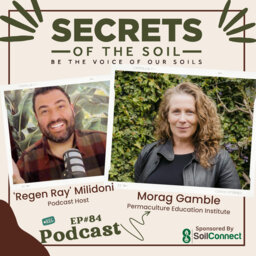In the latest episode of our podcast, Secrets of the Soil, we dive into the urgent need to bridge the gap between research and actionable strategies for sustainable agricultural practices. Our guest, Adam O’Toole from the Norwegian Institute of Bioeconomy, shares invaluable insights on how we can work together to improve soil health and support our planet’s ecosystem.
📌 Key Takeaways:
– Lighthouses for Sustainable Farming: Adam introduces the concept of living labs and demonstration farms (lighthouses) as community-driven beacons of sustainable agricultural practices. These sites are essential for education, fostering leadership, and scaling up successful examples across Europe.
– Inclusion and Co-Creation:Top-down approaches are often met with resistance. Adam emphasizes the importance of grassroots movements and involving farmers directly through a collaborative process. True progress happens when farmers, researchers, and authorities co-create solutions together.
– Monitoring and Ecosystem Health:Implementation of robust monitoring programs and specific indicators for ecosystem health is critical to evaluate and track the success of sustainable practices. This approach ensures continuous improvement and adaptation.
Tune in to learn more about how we can support soil health and, ultimately, the health of our planet. 🌍
Who is Adam O’Toole?
Adam O’Toole is a soil scientist and communicator working for the Norwegian Institute of Bioeconomy. He did his Ph.D. research on the Agronomic and Environmental Effects of Biochar under Norwegian conditions. He is currently involved in a European-wide project called Prepsoil which is educating Europeans about the importance of taking care of soils. This is part of a wider initiative called the European Soil Mission which has the ambition to establish 100 living labs where farmers, researchers, and innovators devise, test, and demonstrate methods that can lead to healthier soils in Europe.

The Urgency for Sustainable Agricultural Practices
In the latest episode of *Secrets of the Soil*, guest Adam O’Toole, a soil scientist from the Norwegian Institute of Bioeconomy, elaborates on the pressing need for sustainable agricultural practices in response to worsening environmental conditions. Farmers around the world face immense challenges due to soil degradation, climate change, and economic constraints. However, O’Toole believes that the solution lies in bridging the gap between research and actionable practices at the grassroots level.
Resistance to Top-Down Approaches
One of the critical hurdles discussed in the episode is the resistance of farmers to top-down approaches imposed by governing bodies such as the European Union. These approaches often overlook the nuanced realities of farming communities and fail to gain their trust and cooperation. O’Toole highlights the importance of shifting from these rigid frameworks to more inclusive, grassroots movements. “Farmers need to be part of the solution, not just the subjects of policies,” he emphasizes.
Introducing Living Labs and Lighthouses
A groundbreaking concept introduced by O’Toole is that of “living labs” and “lighthouses.” These are demonstration farms where sustainable agricultural practices are not just tested but lived and experienced. In these settings, farmers can witness firsthand the benefits of sustainable practices, encouraging them to become leaders in their regions. The idea is to create a network of these lighthouses across Europe, helping to upscale good examples and establish a peer-led movement towards sustainable farming.
Measuring Success with Ecosystem Health Indicators
To ensure that these sustainable practices are genuinely effective, O’Toole discusses the implementation of robust monitoring programs. Specific indicators for ecosystem health, such as soil carbon levels, erosion rates, and biodiversity counts, are used to measure the success of these initiatives. This data-driven approach not only validates the practices but also provides a tangible way to communicate their benefits to a broader audience.
Overcoming Economic and Knowledge Barriers
One of the significant challenges in transitioning to sustainable practices is the economic strain on farmers. For instance, many olive farmers in Spain leave soils bare between trees due to financial constraints. O’Toole argues that there is a dire need to support farmers financially to undertake ecosystem services. Additionally, a lack of understanding of the commodities market and contractual obligations often prevents farmers from making sustainable choices. Financial institutions prefer short-term economic gains, which can be detrimental to soil health.
The Need for Experiential Learning
Both O’Toole and host Regen Ray Milidoni emphasize the importance of experiential learning. Farmers benefit the most when they can see, touch, and experience the impact of sustainable practices. The living labs and lighthouses agenda aims to provide these real-world, hands-on learning experiences. “It’s about learning from experience and cross-pollinating ideas from different industries,” says Milidoni, quoting the value of nature and outdoor environments in generating good ideas.
Regional Approaches to Sustainable Farming
O’Toole underscores that sustainable farming must be tailored to regional conditions. Different soils, climates, and cultures require unique approaches to be effective. He discusses the Marda Agricultural College in Trundelag, Norway, as an exemplary model. The college not only educates farmers but also serves as a national center for renewable energy and environmentally friendly farming, implementing sustainable practices such as solar panels and biochar testing.
Community-Driven Solutions
Highlighted in the episode are efforts like the European Soil Partnership, which aims to gather resources and knowledge from various communities across Europe to address soil degradation. O’Toole mentions the importance of local stories and initiatives, such as his project featuring farmers speaking on behalf of the soil to celebrate World Soil Day. These efforts are designed to foster a sense of ownership and responsibility among farmers for soil health.
Wrapping up the episode, Milidoni encourages listeners to contribute to the movement by recording and sharing their local soil stories. The collective action of individuals in their backyards can have a ripple effect, leading to significant improvements in soil health globally. O’Toole’s personal goal of ensuring no biomass leaves his suburban property in Norway serves as a small yet impactful example.
Sponsored by soilconnect.com.au, this podcast episode reiterates its weekly mission to explore the secrets of soil and give it a voice. By fostering grassroots solutions and emphasizing the role of living labs, Adam O’Toole and Regen Ray Milidoni illuminate a path towards a sustainable and thriving agricultural future.






